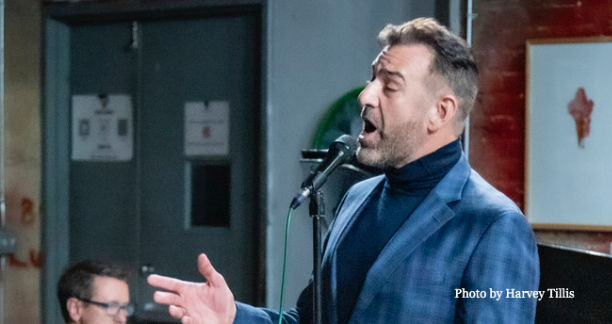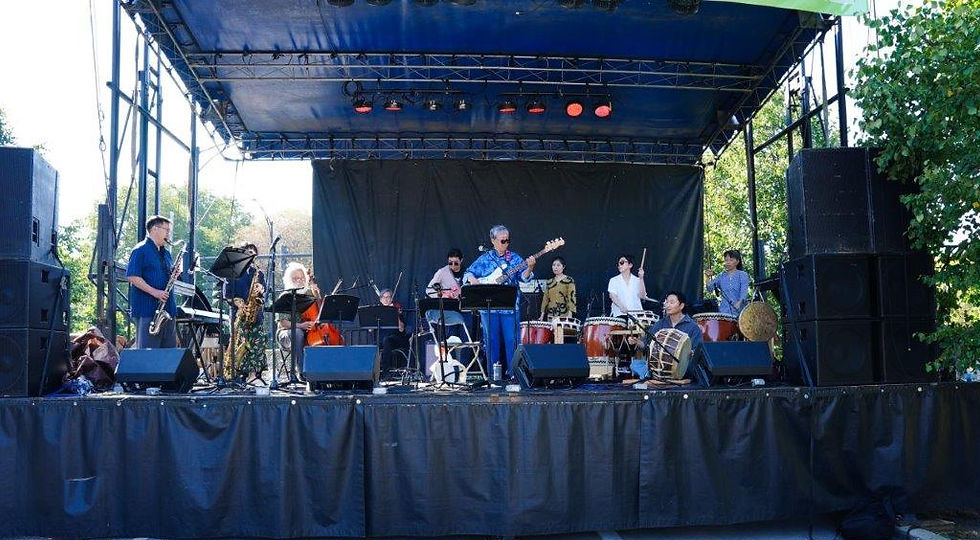Joe Alterman - Celebrating the Legacy of Mister Kelly's & the London House
- ChicagoJazz.com

- Dec 3, 2018
- 8 min read

Joe Alterman photo by Stephen Payne
Pianist Joe Alterman is coming to Winter’s Jazz Club on December 7th & 8th to perform a special show celebrating the legacy of two legendary jazz rooms, Mister Kelly’s and the London House. We talked with Joe about his upcoming performance as well as how the music that was performed at these clubs helped to inspire and influence his own musical development.
Chicago Jazz Magazine: Let’s talk about how you first were exposed to jazz. Did you grow up in a musical home?
Joe Alterman: As I often like to joke to people when they ask how I got into jazz, “it’s my Dad’s fault.” While my Dad isn’t a musician himself, there’s something very musical about the way he listens to and talks about music and, because of that, I’ve long felt that he could’ve been a great musician had he given that a shot. Music has long been an important thing to my Dad - especially piano music, but, while he certainly had his favorites, he preferred listening to things outside of his comfort zone (instead of pushing his favorites on me) and, recognizing my early interest in music, took me along for many of these experiences. There is a bluegrass festival in Dahlonega, Georgia that we went to each year that was very formative for me - surprisingly - in terms of my jazz training. Many of the songs I’d hear at this festival were tunes that are a part of the jazz repertoire, but I came to know them first as part of the bluegrass repertoire. Whereas many of my jazz peers grew up hearing jazz music in concert halls and more “serious” settings, I grew up hearing these songs in “fun” settings - bluegrass festivals, barbecues - and I’d always take note of how everything would change the moment the music started. I’m glad I was first exposed to these songs in these environments because it helped me see, from an early age, how happy music made others, and it also made me realize that I needed to have technique to be able to play, but that technique wasn’t everything - the feeling in the music was. I often wish people in the jazz clubs would holler and dance like they would at that Bluegrass festival. But, come to think of it, maybe that’s one of the things that so drew me into the music of Ramsey Lewis…you can easily hear the positive effect it was having on the audience in the recordings.
Chicago Jazz Magazine: Was there a specific experience that drew you to make the piano your instrument?
Alterman: I started piano lessons at the age of 5 but immediately wanted to quit. However, having already started, my parents wouldn’t let me. I kept up my classical lessons (begrudgingly) until the age of 12 when I decided I wanted to take guitar lessons. My parents got me guitar lessons under the condition that I continue my piano lessons. It was during this period that my Dad started buying jazz and blues piano records that he thought might finally turn me onto the piano. I remember the first one - a Bill Evans one - didn’t work, but the next batch - Oscar Peterson, Ramsey Lewis and Jimmy Smith - did. Before long, I was trying to learn Jimmy Smith riffs on the guitar but, after realizing both that I was a much more capable pianist than guitarist (and that I was trying to learn keyboard riffs on the guitar), I finally fell in love with piano. I especially loved boogie-woogie music and, after I made a last minute change (without telling my teacher) at my classical school’s piano recital - ditching my classical piece for a boogie-woogie one - I was thrown out of the school. After that, I found a jazz teacher and was on my way!

Houston Pearson and Joe Alterman photo by Frank Kaufman
Chicago Jazz Magazine: Was there a recording that stands out which helped to shape and motivate your playing?
Alterman: Ahmad Jamal’s recording of “Like Someone In Love” from his Live At The Blackhawk recording absolutely changed my life. However, it was honestly just a two second clip that did so. Towards the beginning of the song, he plays a bell-like embellishment on one note of the melody that was (and still is) perhaps the “coolest” thing I’ve ever heard. I remember rewinding the recording hundreds and hundreds of times just to hear that one second. I’d never heard anything like it and still haven’t.
Chicago Jazz Magazine: After high school you attended New York University and received your Bachelor’s and Master’s degrees in jazz piano. Can you talk about why you choose New York University, who you studied with and if you think it is important for young musicians to attend college in order to grow as a musician?
Alterman: My time in New York and at NYU was the greatest experience of my life. I loved how we’d spend all day in school learning about the jazz greats and then go out and hear them at night. I specifically remember conversations with both Cedar Walton and James Moody, where I’d tell them what I had learned about them and they’d correct my books and teachers. It was fascinating, and fun. While New York was, of course, great from a learning and professional standpoint, getting to spend time and learn from some of the greats, especially my piano teacher, the late great, truly underrated Don Friedman. He taught me the most important lesson of all and that is that music is life, and vice versa. Don and I spent a lot of time together and up until that point in my life, I’d never met anyone like him. I’d never met anyone who radiated such peace, joy and fulfillment; it was obvious, too, that the music, not money, had gotten him there. He glowed, radiating such joyfully contagious energy that, I remember thinking as a college freshman, “If music can make me feel like that, I want to do that!” It was obvious, simply by being around him, that he’d spent his time doing what he loved, and you could feel the effect of that through his warm energy.
While music school certainly helped, me grow as a musician, music school, and especially being in New York and interacting with so many great musicians, taught me more about myself as a person and as a musician which, in the end, was the best thing that could’ve happened to both me and my music. However, I learned more about music itself (or, at least what it means to be a professional musician) from the gigs that started coming in after I graduated.

Joe Alterman photo by Frank Kaufman
Chicago Jazz Magazine: Was there a performance that stands out for you that gave you the confidence as a player to pursue music as a career?
Alterman: No, there wasn’t. I just knew I loved music and wanted to play. I tried hard to get gigs while in college simply because I wanted to perform. Before long (or more precisely, after two years of emailing each venue I wanted to get into twice a month with no response), I suddenly had a bunch of gigs and was, I suppose, a professional musician.
Chicago Jazz Magazine: Let’s talk about Mister Kelly’s and the London House. You are coming into Winter’s on December 7th and 8th to perform a tribute to the legendary venues. At 30 years old obviously, you are too young to have ever attended a performance at either club so what is it about those places spots that has inspired you to create this show?
Alterman: Oscar Peterson’s London House recordings were another life-changer. I first heard them around the age of 13 and, to this day, barely a day goes by that I don’t play something from them. I’d often sit in awe listening to those recordings, jealous of those in attendance (wondering how incredible it all must’ve felt to have been there, experiencing it all live). I was very lucky to open for Ramsey Lewis at the Blue Note in New York and was fascinated to learn that, as a London House intermission pianist, he got to hear Oscar’s group at London House for three weeks at a time, four sets a night, twice each year and, in addition to getting to hear him, he got to interact with him, too. I opened for Ramsey maybe 5 times at the Blue Note and learned so much from our backstage talks. However, I remember thinking: if I’m learning this much from these occasional opening acts, how much could Ramsey have learned from being around Oscar three weeks at a time, four sets a night, twice each year? And that, I suppose, is what got me really interested in delving into the London House/Mister Kelly’s history and legacy.
Chicago Jazz Magazine: How have you gone about researching the history of the clubs in order to create the repertoire for the performances?
Alterman: I was so interested in finding out what Ramsey and others learned from their London House experiences (and what it meant to them) that I spent much time interviewing both Ramsey and Les McCann and listening to David Marienthal and his team’s previously recorded interviews with others for the documentary on Mister Kelly’s and the London House and trying to figure out what these now-legends learned during their formative years at London House. I put my findings into a paper that the Mister Kelly’s team published (you can read it here) and because the content from that piece was so extremely inspiring to me, I’ve been trying to think of other things to do with it and, out of that, this show was born.
Chicago Jazz Magazine: Who is performing with you that evening and what can people expect to hear on December 7th & 8th?
Alterman: I am extremely lucky (and excited) to be joined by Jeremiah Hunt (bass) and Charles Heath (drums). My biggest takeaway from my London House research is that London House, like the ultimate goal of the practice of the music itself, helped one further discover oneself. I find it both ironic and fitting that, just as the greatest thing one could’ve learned from their time at London House was to be oneself, I, in doing my London House research, feel further encouraged that my job as a musician is to embrace myself too. Therefore, while people can certainly expect to hear interesting stories and context surrounding London House/Mister Kelly's and songs that they're both familiar and unfamiliar with (and some that may be surprising. Hint: "I Heard It Through The Grapevine), I won't be doing a standard "tribute" concert. Instead, I'll be paying tribute to the context within that inspired me to want to play music and embrace the things that I both connect with and love so much. In other words, much of what I’ve learned because of my love of Oscar Peterson’s London House recordings, inspired me to search for/find myself, and that’s the spirit with which I approach this tribute.
Chicago Jazz Magazine: Outside of your appearance at Winter’s Jazz Club what else do you have coming up?
Alterman: I just released a brand new album - my very first live one. It’s entitled “More Cornbread”, and I hope people will give that a listen (and enjoy doing so)!
For information on upcoming performances and his new release www.joealtermanmusic.com







